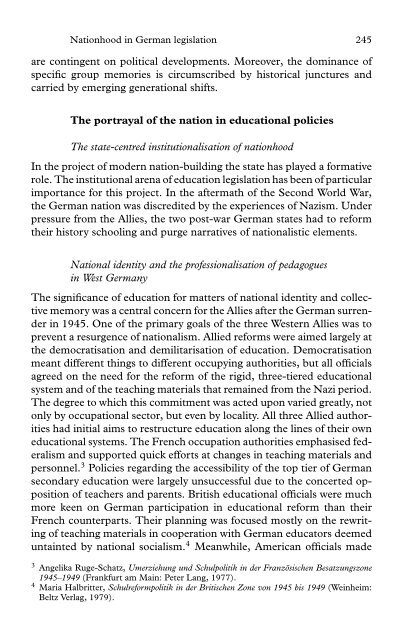Memory and Power in Post-War Europe: Studies in the Presence of ...
Memory and Power in Post-War Europe: Studies in the Presence of ...
Memory and Power in Post-War Europe: Studies in the Presence of ...
Create successful ePaper yourself
Turn your PDF publications into a flip-book with our unique Google optimized e-Paper software.
Nationhood <strong>in</strong> German legislation 245<br />
are cont<strong>in</strong>gent on political developments. Moreover, <strong>the</strong> dom<strong>in</strong>ance <strong>of</strong><br />
specific group memories is circumscribed by historical junctures <strong>and</strong><br />
carried by emerg<strong>in</strong>g generational shifts.<br />
The portrayal <strong>of</strong> <strong>the</strong> nation <strong>in</strong> educational policies<br />
The state-centred <strong>in</strong>stitutionalisation <strong>of</strong> nationhood<br />
In <strong>the</strong> project <strong>of</strong> modern nation-build<strong>in</strong>g <strong>the</strong> state has played a formative<br />
role. The <strong>in</strong>stitutional arena <strong>of</strong> education legislation has been <strong>of</strong> particular<br />
importance for this project. In <strong>the</strong> aftermath <strong>of</strong> <strong>the</strong> Second World <strong>War</strong>,<br />
<strong>the</strong> German nation was discredited by <strong>the</strong> experiences <strong>of</strong> Nazism. Under<br />
pressure from <strong>the</strong> Allies, <strong>the</strong> two post-war German states had to reform<br />
<strong>the</strong>ir history school<strong>in</strong>g <strong>and</strong> purge narratives <strong>of</strong> nationalistic elements.<br />
National identity <strong>and</strong> <strong>the</strong> pr<strong>of</strong>essionalisation <strong>of</strong> pedagogues<br />
<strong>in</strong> West Germany<br />
The significance <strong>of</strong> education for matters <strong>of</strong> national identity <strong>and</strong> collective<br />
memory was a central concern for <strong>the</strong> Allies after <strong>the</strong> German surrender<br />
<strong>in</strong> 1945. One <strong>of</strong> <strong>the</strong> primary goals <strong>of</strong> <strong>the</strong> three Western Allies was to<br />
prevent a resurgence <strong>of</strong> nationalism. Allied reforms were aimed largely at<br />
<strong>the</strong> democratisation <strong>and</strong> demilitarisation <strong>of</strong> education. Democratisation<br />
meant different th<strong>in</strong>gs to different occupy<strong>in</strong>g authorities, but all <strong>of</strong>ficials<br />
agreed on <strong>the</strong> need for <strong>the</strong> reform <strong>of</strong> <strong>the</strong> rigid, three-tiered educational<br />
system <strong>and</strong> <strong>of</strong> <strong>the</strong> teach<strong>in</strong>g materials that rema<strong>in</strong>ed from <strong>the</strong> Nazi period.<br />
The degree to which this commitment was acted upon varied greatly, not<br />
only by occupational sector, but even by locality. All three Allied authorities<br />
had <strong>in</strong>itial aims to restructure education along <strong>the</strong> l<strong>in</strong>es <strong>of</strong> <strong>the</strong>ir own<br />
educational systems. The French occupation authorities emphasised federalism<br />
<strong>and</strong> supported quick efforts at changes <strong>in</strong> teach<strong>in</strong>g materials <strong>and</strong><br />
personnel. 3 Policies regard<strong>in</strong>g <strong>the</strong> accessibility <strong>of</strong> <strong>the</strong> top tier <strong>of</strong> German<br />
secondary education were largely unsuccessful due to <strong>the</strong> concerted opposition<br />
<strong>of</strong> teachers <strong>and</strong> parents. British educational <strong>of</strong>ficials were much<br />
more keen on German participation <strong>in</strong> educational reform than <strong>the</strong>ir<br />
French counterparts. Their plann<strong>in</strong>g was focused mostly on <strong>the</strong> rewrit<strong>in</strong>g<br />
<strong>of</strong> teach<strong>in</strong>g materials <strong>in</strong> cooperation with German educators deemed<br />
unta<strong>in</strong>ted by national socialism. 4 Meanwhile, American <strong>of</strong>ficials made<br />
3 Angelika Ruge-Schatz, Umerziehung und Schulpolitik <strong>in</strong> der Französischen Besatzungszone<br />
1945–1949 (Frankfurt am Ma<strong>in</strong>: Peter Lang, 1977).<br />
4 Maria Halbritter, Schulreformpolitik <strong>in</strong> der Britischen Zone von 1945 bis 1949 (We<strong>in</strong>heim:<br />
Beltz Verlag, 1979).
















